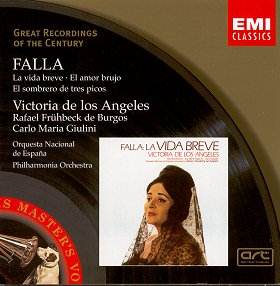Here is treasure indeed - a 2CD compilation of classic performances
of all but three of de Falla’s acknowledged masterpieces (although he
lived for nearly 70 years, his output was quite meagre) – plus the glorious
singing of Victoria de los Angeles. Her interpretations of this, the music
of her homeland, are definitive, natural and refined without recourse
to over-emphasis or unnecessary distortion for extra colour or dramatic
effect. In comparison to Conchita Supervia she was gentler, more graceful
(but, it has to be said, Supervia was more effective in the more earthy
and racy episodes.) The Spanish conductor, Raphael Frühbeck de Burgos
provides the perfect idiomatic reading of La Vida Breve in support
and of The Three Cornered Hat ballet music
The compilation balances well the brief opera, the
Seven Popular Spanish Songs with piano, the two ballets (Giulini providing
another colourful reading of Love the Magician), and the
two songs with harp and chamber ensemble that completes CD 2.
La Vida Breve is about love and jealousy
in Granada. Poor working class Salud (de los Angeles) is jilted by her
lover Paco (a falsely ardent Carlo Cossutta) for a richer girl. Demented
by grief, Salud bursts in on Paco’s wedding party and roundly accuses
him of perfidy before dropping dead at his feet. The opera opens with
a lusty chorus from the workmen in the smithy close to Salud’s home.
They bemoan their fate "it’s hard to be born an anvil instead of
the hammer". In a brilliant stroke of theatre, de Falla will put
almost exactly these same words into Salud’s mouth when she bemoans
her fate as a poor working class woman betrayed. Victoria de los Angeles
colours her voice through the joy of loving, the anxiety at her lover’s
lateness for their tryst, the intensity of her passion for him and the
ultimate anger, hurt and desolation of her betrayal. Her control, contouring
the sinuous lines, and through the demanding rhythmic and dynamic shifts
of her arias, is exemplary. De Burgos’ accompaniment is splendidly vibrant
especially through the atmospheric and colourful intermezzos and the
familiar dances of the wedding party.
The Seven Popular Songs provide de los
Angeles with further opportunity to demonstrate her versatility in expressive
singing across the impressive range of her voice. She is rueful in expressing
the spoilage of an expensive fabric in The Moorish Cloth;
censoring of promiscuity in the Segudilla from Murcia; languid
and mournful in the Asturian Song; assertive and confidant of
her love in the Jota; comforting and caressing in the Lullaby;
alternatively angry and beseeching in the Song of treacherous
love; and cursing love defiantly in Polo.
CD2 concentrates on the ballet music. Both suites contain
material for soprano although this is restricted to two short numbers
in The Three-Cornered Hat which is about a farcical set
of misunderstandings caused by the jealousies and flirtings of the miller
and his young attractive wife and the magistrate’s unwelcome attentions
to her. The ballet contains some of de Falla’s best known and colourful
dances including: the miller’s wife’s Fandango; the neighbours’ Seguidilla;
the miller’s dance (Farruca) and the lovely Nocturne – all excitingly
and beguilingly played by the Philharmonia Orchestra.
Love the Magician has more material for
de los Angeles in a smoky voice. She first has a ‘Song of Plaintive
Love’ in which she complains, in exasperation, that the ghost of her
faithless but now jealous dead lover will not let her have any peace
or opportunity to enjoy love with a new boy friend. Coquettishly, she
sings the ‘Song of the will-o’-the-wisp’ suggesting if you flee from
love it will pursue you but if you call for it, it runs away. Then,
in defiance and anger, she sings ‘The dance of the game of love’ as
she lays the tormenting ghost; and, finally joyously celebrates her
new love as a new day dawns to ‘Morning Bells’. Giulini’s reading is
atmospheric and colourful enough although I would like to have heard
more life in the popular ‘Pantomime’ number but the well-known Ritual
Fire dance has spark.
Concluding the programme are the two songs. Sonnet
to Córdoba, accompanied by harp, is an
affectionate, almost sentimental homage to one of the major cities in
de Falla’s home region and de los Angeles responds warmly. Psyché,
with its pastel-shaded chamber ensemble accompaniment
is altogether more interesting. It fuses de Falla’s sharp Spanish colours
with the more muted tints of the French Impressionists. It begins in
misty languor as Psyché opens her eyes to greet the dawn but
the colours grow more vivid and her response more awakened as the morning
sunshine intensifies.
A vibrant, colourful compilation representing a large
proportion of de Falla’s masterpieces highlighted by the glorious voice
of Victoria de los Angeles. Heartily recommended.
Ian Lace

